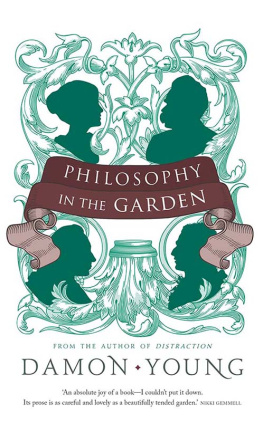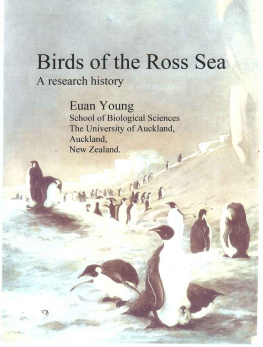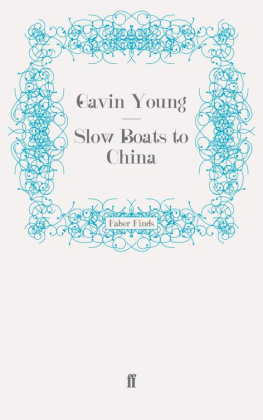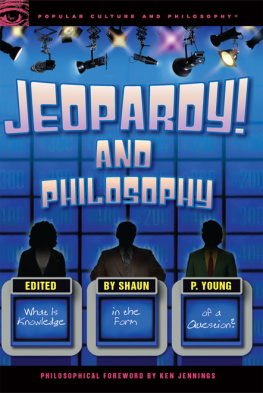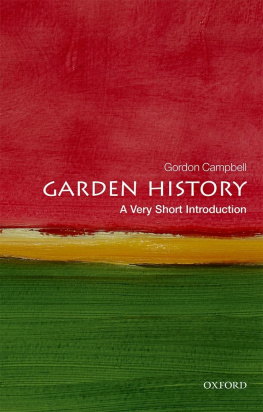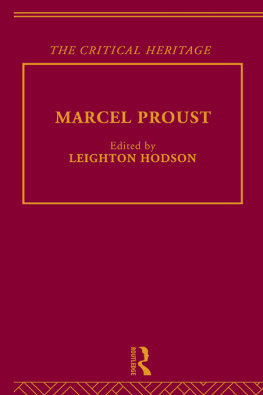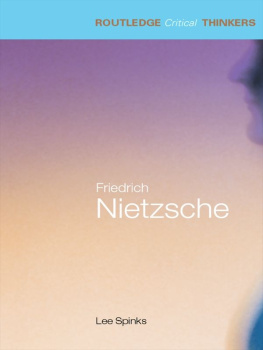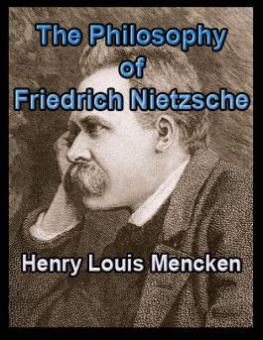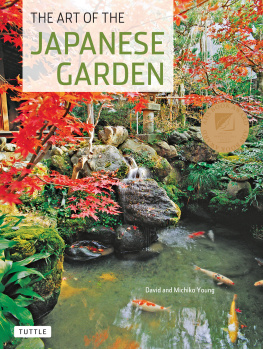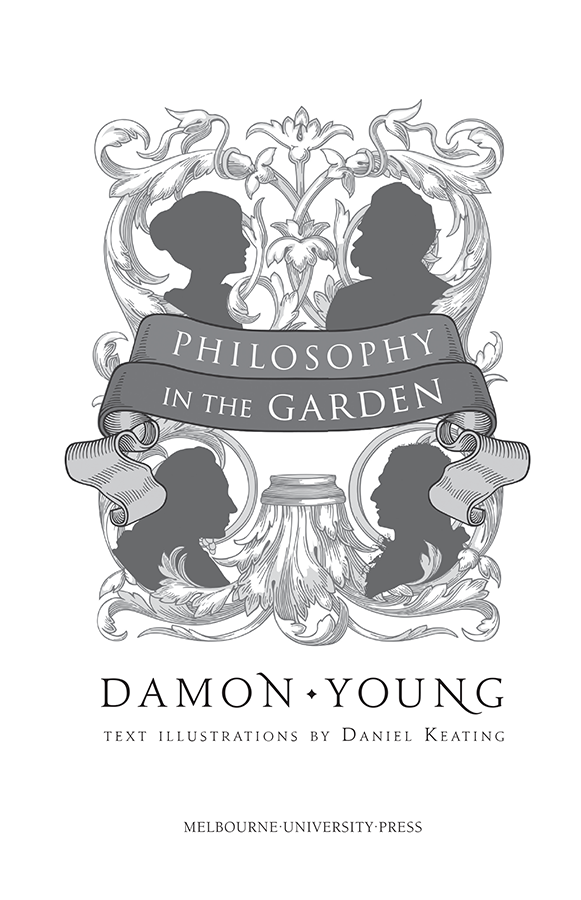
Contents
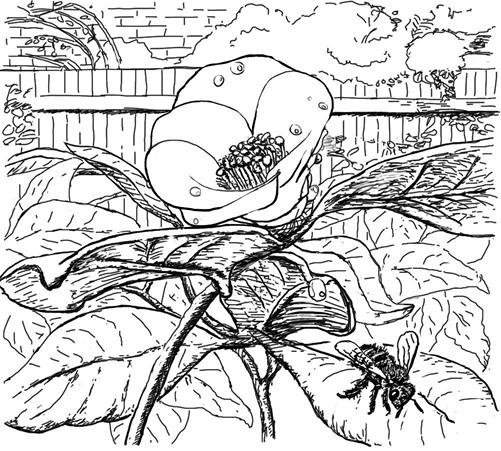
Philosophy Alfresco
Every realm of nature is marvellous
Aristotle, On the Parts of Animals
Aristotle had a reputation as a dandy. According to ancient biographer Diogenes Lartius, the father of scientific philosophy lisped fashionably, and was known for his schmick wardrobe and bling. The impression, bolstered by his ties to the Macedonian royals, is of a metropolitan bon vivant with a taste for opulence. And this makes historical sense: as Aristotle himself noted, philosophy arose in big, rich cities, which gave literate upper classes the leisure to converse and write. But Aristotles school was not in the Macedonian court, Athens prestigious suburbs like Kerameikos, or the agora , the busy marketplace. The philosopher preferred to give his famous lectures in a park.
His school, the Lyceum, was named for the shaded groves where the philosopher rented his buildings. Situated east of the city walls, the Lyceum was dedicated to Apollo Lyceus, the son of Zeus in his wolf god guise. It had walks, running tracks, change rooms, wrestling schools, temples and stoa porticoes, shaded from sun and rain. Military parades were held there, along with cult rituals. It was an all-purpose reserve for sports, religion, politicsand philosophy. Aristotle taught his students as they strolled around the peripatoi , the colonnadeshence their name, the peripatetics. His Lyceum also housed the first botanical garden (probably stocked by the Macedonian empire), which undoubtedly contributed to his lost book On Plants .
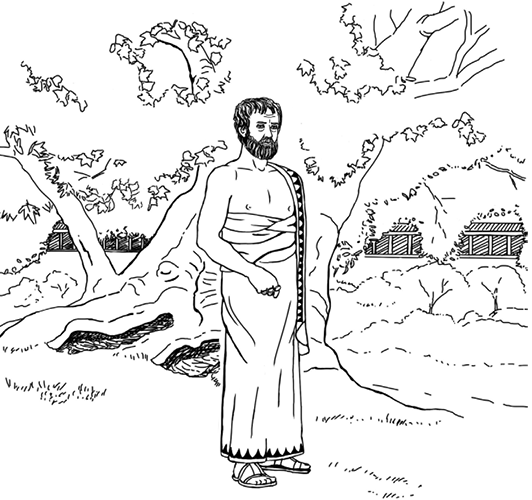
In this, Aristotle was following his teacher Plato, whose Academy was also in a sacred grove, and who similarly taught on the hoof (Ive been doubting long, and walking up and down like Plato, gibed playwright Alexis, but only tired my legs). This devotion to gardens lived on in Classical philosophy. Aristotles own student and successor, Theophrastus, wrote the first systematic treatise on botany, and bequeathed the Lyceum gardens to his colleagues as may wish to study philosophy and literature there on terms of familiarity and friendship. The Lyceum and Academy schools remained at the heart of Mediterranean intellectual life for over two centuries. One of the great Hellenistic critics of Plato and Aristotle, Epicurus, retired to his backyard in suburban Athens for a life of grumbling austerity. His school was called The Garden: a symbol of his independence, and a means of realising it. He who follows nature, Epicurus was quoted by Porphyry as saying, is in all things self-sufficient. Educated Romans also took to gardens for scholarship and conversation, often in a knowing nod to their Greek forebears. Shoved from public office, Cicero wrote of opening an Academy in his own Tusculum villa. He and his students worked while walking outdoors, and Cicero noted the particular joy of watching plants grow. I am principally delighted, said Ciceros Cato in On Old Age, with observing the power, and tracing the process, of Nature in these her vegetable productions. At the end of the Classical era, over seven hundred years after Aristotle opened his school, the Platonic theologian Augustine was converted to Christianity in a garden. I flung myself under a fig tree, he wrote in his Confessions , and gave free course to my tears. Philosophy was often alfresco.
There are many reasons for this. Most obviously, gardens are a bulwark against distraction. Philosophy is a gregarious pursuit, which thrives on social ferment. But too much stimulation leads to madness, not meditation. Even in Classical and Hellenistic Greece, cities were noisy, busy and full of interruptions. Athens streets were small and winding, with residents walking at all hours (often drunk, stumbling home after symposiums). Wagons rumbled and squeaked all day, and if the comic playwright Aristophanes is to be believed, the roads were often dumping grounds for emptied bladders and chamber pots. But Athenians couldnt flee the streets chaos by heading home, as they often had donkeys, goats and other livestock as housemates. The Lyceum let Aristotle and his students escape the commotion of urban life, and focus on the finer points of logic and metaphysics.
The ancient Greeks were also a physical people, for whom study did not mean a sedentary life. The first schools were gymnasiums for sports like sprinting and wrestling. A public park was a place to stretch their legs, flex their oiled muscles. And gardening itself was, as Socrates reportedly pointed out, an exercise. Quite high and mighty people find it hard to hold aloof from agriculture, he was reported to have said, in Xenophons Economist , combining as it does a certain sense of luxury with the satisfaction of an improved estate, and such a training of physical energies as shall fit a man to play a free mans part.
Aristotle, like many of his students, was also an empirical philosopher. That is, he was not content to merely theorisehe wanted hard evidence. Those whom devotion to abstract discussions has rendered unobservant of the facts, he wrote in On Generation and Corruption , are too ready to dogmatise on the basis of a few observations. Hence his cultivation of a botanic garden, and his studies abroad. His work on biological classification was detailed, rigorous and unparalleled for millenniaso much so that Charles Darwin referred to the great taxonomists Linnaeus and Cuvier as mere schoolboys to old Aristotle. For the philosopher, the Lyceum garden was most likely a regular source of philosophical material, for dissection, analysis, synthesis and lecturinga field trip and laboratory demonstration in one.
Nature and Second Nature
But there are more intellectual reasons for philosophys plein-air tradition. The garden is not simply a retreat or source of physical exercise. It is intellectually stimulating in its own right, because it is a fusion of two fundamental philosophical principles: humanity and nature. This is suggested by the word itself, and its cognates in German and the Romance languages: Garten, jardin, giardino . Like the English yard, they refer to enclosure, which requires two things: something cordoned off (nature), and someone to do the cordoning (humanity). Beginning with sacred groves like the Lyceum, every garden is a union of this kind: nature separated, bordered, transformed by humans.
What makes gardens unique is the explicit character of this fusion. Nature is regularly and radically transformed by humans. As Aristotle pointed out, this is the very definition of craft: realising natural possibilities that cannot realise themselves. But in art and manufacturing alike, the contributions and combinations of nature and humanity are often hidden. For example, trees become timber; ore becomes metal, zooplankton and algae become oil then plasticthey are natural in origin, but no longer nature. Nature is understood as wilderness, disease, esoteric symbolsas distant other. Meanwhile, human labour is also invisible: we see products and services, but not necessarily the people who produced them. The garden overcomes this double alienation, by displaying human and natural processes together. Plants and stones remain recognisably plants and stones, but they are arranged, cultivated and maintained artfully. In this, they demonstrate our specific relationship with naturewhat we make of it, physically and intellectually. In the garden, this reality, normally hidden or forgotten, becomes a striking spectacle: a show, a display, a presentation. To use Aristotles terminology, this primordial relationship is the very possibility that is realised in the garden: it is the demonstration of our physical and intellectual interdependence with nature. The garden makes the humanised cosmos visible and intelligiblea fusion that is seen, felt and thought.

